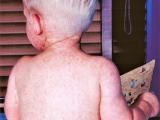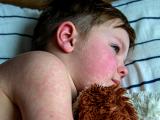Oct 4, 2010
Oklahoma Salmonella outbreak grows
Oklahoma health officials said a Salmonella outbreak has expanded to 16 cases in three counties, and there are possibly related cases in Iowa and Nebraska, according to an Oct 2 Reuters report. The Oklahoma cases involve at least four elementary schools, said Leslea Bennett-Webb, a spokeswoman for the Oklahoma Health Department (OHD). The outbreak strain has been identified as Salmonella Java, but the source has not yet been identified, the story said. Laurence Burnsed, the OHD's communicable disease director, said the department is monitoring cases of a similar strain of Salmonella in Iowa and Nebraska, according to an Oct 2 report by The Oklahoman. The Oklahoma patients had their first symptoms between Sep 2 and 13, Burnsed reported. The story said one patient, an adult, has been hospitalized, but there have been no deaths.
Oct 2 Oklahoman report
Vaccine expert sees disease threat in antivaccine movement
Vaccine expert Paul Offit, MD, speaking today at the annual meeting of the American Academy of Pediatrics (AAP), linked the resurgence of diseases such as pertussis and measles in the United States to rising numbers of parents who chose not to vaccinate their children. Offit, a frequent critic of the antivaccine movement, described the historical origins of religious and philosophical exemptions from vaccination, the impact of the exemptions on vaccination rates and vaccine-preventable diseases, and the balance between individual freedoms and societal good, according to a press release from the AAP. He said parents are "bombarded" with false information about vaccine dangers, which is eroding the number of parents vaccinating their kids. "This is tragic, because it leaves children vulnerable to deadly diseases, and it lowers the immunity of the entire community," he said, warning that if the patterns continue, more diseases that the healthcare community thought were vanquished by vaccines may gain a foothold in pediatric populations. Offit, who helped develop the rotavirus vaccine, is chief of infectious diseases and director of the Vaccine Education Center at the Children's Hospital of Philadelphia. The AAP's annual meeting in San Francisco started Oct 2 and runs through tomorrow.
More health facilities require flu immunization for staff
Two health systems and a hospital near Chattanooga, Tenn., are now requiring flu vaccination for healthcare workers, the Chattanooga Times Free Press reported today. They include Parkridge Health System and Memorial Health Care System, which have several facilities in the area, and Hutcheson Medical Center in Fort Oglethorpe, in northwest Georgia. Employees who don't receive the vaccine must wear a face mask in patient care areas during flu season, according to the report. Brian Lazenby, spokesman for Memorial Health Care System said the reasons for exemptions include egg allergy, previous serious vaccine reaction, or religious beliefs, which includes a personal conviction against getting vaccines. In late August the Society for Healthcare Epidemiology of America (SHEA) joined the list of organizations calling for mandatory flu vaccination for healthcare workers, and in early September theAAP followed suit. The US Centers for Disease Control and Prevention (CDC), in its latest guidance, stops short of recommending mandatory flu shots for this group, and instead highlights strategies that can successfully boost voluntary flu vaccination. The CDC's vaccine advisory group is expected to discuss mandatory flu vaccination for healthcare workers at its meeting in June 2011.
Oct 4 Times Free Press story
Secondary pandemic H1N1 transmission found in 80% of households
Canadian researchers found household transmission of pandemic 2009 H1N1 influenza to be "substantially" higher than previously estimated, and that one tenth of such infections may be asymptomatic. They studied 43 index patients in 42 households and 119 household contacts and identified 53 lab-confirmed secondary infections, for a secondary attack rate of 45%. Only eight households (19%) had no secondary cases. Of the 53 secondary case-patients, 5 (9.4%) were asymptomatic. Children younger than 7 years were at the highest risk of developing lab-confirmed flu-like illness, and index patients who had both diarrhea and vomiting were most likely to transmit H1N1. The authors concluded, "Household transmission of pH1N1 may be substantially greater than previously estimated."
Oct 1 Clin Infect Dis abstract
WHO says Angolan polio outbreaks threaten African eradication efforts
The United Nations (UN) launched a polio vaccination campaign targeting 5.6 million Angolan children as the World Health Organization (WHO) warned that the country was becoming the greatest threat to Africa-wide eradication of the disease, according to a UN press release. Angola is one of three African countries in the past 4 months to record polio cases, and one of the other two, the Democratic Republic of Congo, saw incursion of the disease across its Angolan border. Regions of Angola that had been polio free were re-infected this year, said WHO spokesman Rod Curtis. Over the past 3 days and again at the end of this month, the WHO, the UN Children's Fund, and Rotary International are funding a house-to-house campaign to ensure every child under 5 years receives an oral polio vaccine. Curtis said the efforts are geared to closing immunization gaps left by previous campaigns, in which up to 30% of children were missed. He said the WHO believes the outbreak can be rapidly stopped, even by the end of the year, if these gaps are closed.
Oct 1 UN press release



















